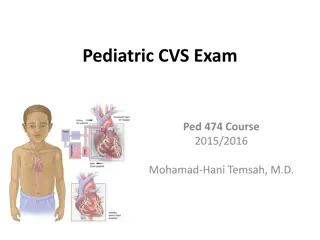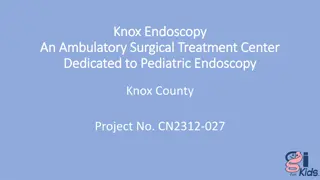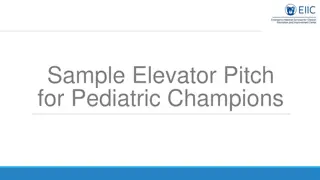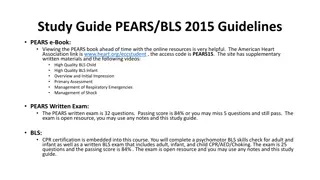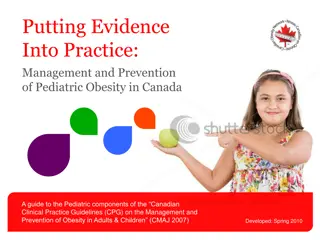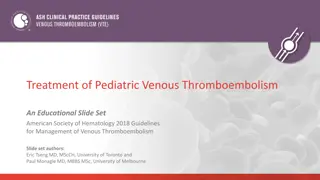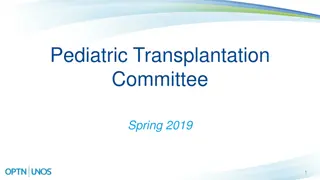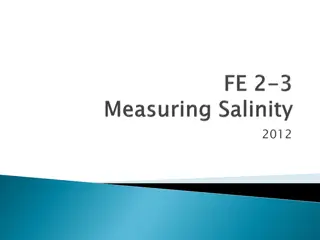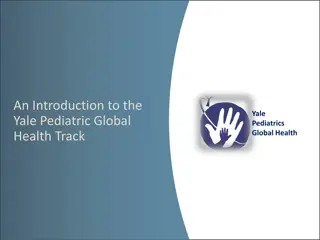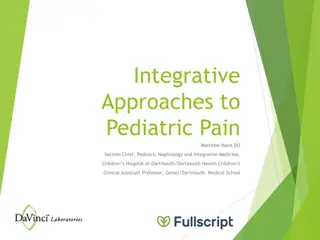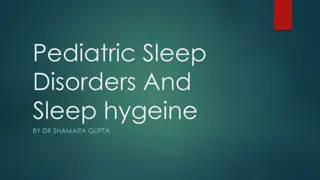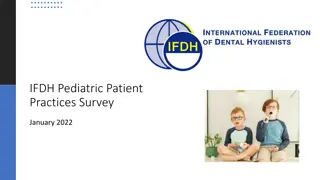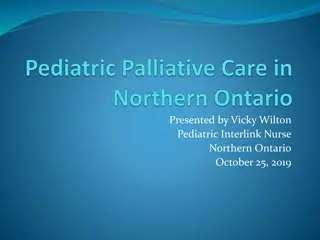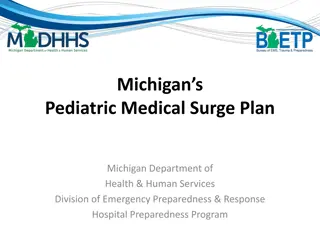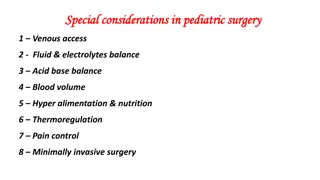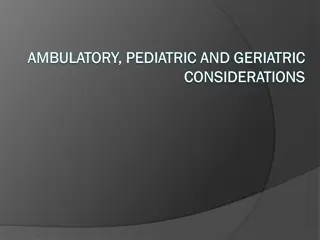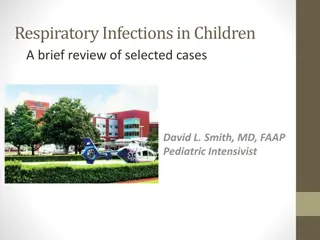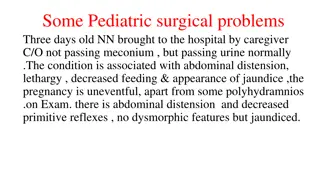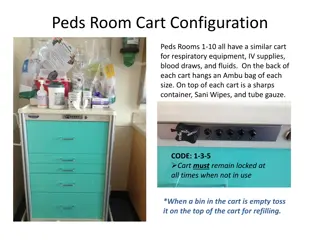Pediatric Procedures Overview
The Royal College of Paediatrics and Child Health focuses on training healthcare professionals to perform pediatric procedures competently and compassionately. The curriculum emphasizes acquiring skills from novice to expert level, including advanced life support and key clinical procedures. Underpinning knowledge in frameworks, communication, infection control, and legality of consent is crucial. The Dreyfus Model of Skill Acquisition is referenced to illustrate skill progression. Considerations for every procedure include the right technique, timing, setting, and patient care.
Download Presentation

Please find below an Image/Link to download the presentation.
The content on the website is provided AS IS for your information and personal use only. It may not be sold, licensed, or shared on other websites without obtaining consent from the author. Download presentation by click this link. If you encounter any issues during the download, it is possible that the publisher has removed the file from their server.
E N D
Presentation Transcript
Procedures The Royal College of Paediatrics and Child Health is a registered charity in England and Wales (1057744) and in Scotland (SCO38299).
Curriculum overview Learning outcome Key capabilities Adapts clinical examinations to meet the needs of the child and family or carers, undertaking basic paediatric clinical procedures. Performs appropriate clinical examinations of a baby, child and young person. Level 1 Demonstrates that they have achieved both basic and advanced life support skills. Recognises emergency situations, knowing when and how to escalate appropriately; initiates basic life support and carries out advanced life support with guidance. Undertakes key procedures including the following: Peripheral venous cannula Lumbar puncture Advanced airway support, including tracheal intubation Umbilical venous cannulation Supervises and assesses junior staff when undertaking clinical procedures; responds to and leads emergency situations, and performs advanced life support. Ensures the correct placement of arterial and venous access. Level 2 Supervises and assess junior staff undertaking clinical procedures. Responds to and leads emergency situations, and performs advanced life support. Maintains skills at the level of competency. Demonstrates competence in the full range of clinical skills relevant within paediatrics and either general paediatrics or their chosen sub-speciality. Level 3 Utilises the skills of other health professionals when required.
Underpinning knowledge Frameworks and legality of consent. Communications History taking, diagnosis and medical management Using medical devices and equipment safely Procedures Infection control
Procedures Learning to competently and compassionately perform procedures is one of the hardest skills in paediatrics. Acquisition of skills is a continuum from novice to expert. Developing the skills to competently teach as well as perform procedural skills is an important part of training.
Dreyfus Model of Skill Acquisition Adaptability transcends reliance on rules Deep understanding and intuitive grasp of skill Expert/Master Holistic view/perception of goals Prioritization of important aspects Perceives deviations from normal pattern/adapts situation Proficient Advance planning Copes with multiple activities/information Formulates Routines Competent Limited situational awareness Individual steps given equal importance Advanced Beginner Strict adherence to rules Little situational awareness/discretionary judgment Novice Adapted from Dreyfus and Dreyfus,1980
Things to consider for every procedure Right procedure, place, time and patient. Right people Supervision, Senior help if required, play specialist, assistant. Consent is it needed? Have you informed the parents / patient of the procedure. Check equipment Analgesia/Distraction aids Important blood results e.g. LP check platelets.
How to evidence Directly observed procedures Best done at the time with contemporaneous feedback Skills log Keep a contemporaneous log of skills competence including supervising others Reflective log Part-task simulation and Resuscitation courses Mini-CEX Demonstrating clinical examination of a baby, child or young person or basic resuscitation skills ACAT Observed leading resuscitation in ED/Labour Ward Mini-CEX/CBD For the senior supervising or teaching the procedure
Steps for learning a new procedure Revise relevant clinical knowledge Safe use of equipment Learn the procedural steps Practice outside clinical environment e.g. part task simulation/mannequins Perform supervised procedures with feedback Practice in a variety of different contexts/ situations/age groups Maintain capability
Example Advanced Airway Management Revise the relevant clinical knowledge Paediatric airway anatomy, watch some videos to understand clinical anatomy before you pick up a laryngoscope! Understand the steps of the procedure and be able to safely use the relevant equipment.
Pre-patient training Before you do your first intubation get someone to supervise you using a mannequin and give you feedback on positioning and laryngoscopy technique.
Further practice Preparation, preparation, preparation if your department has an intubation checklist use it. Another great way to get experience is to arrange to shadow an anesthetic colleague. For more advanced airway management you can attend a difficult airway course in your region.
Procedural top-tips Identify what you need to practice - Put yourself forward for procedures to the clinical team coordinator and the procedures you would like to gain competence in Be proactive with learning opportunities e.g. organizing anesthetic room experience for airway management Ask for feedback when leading resuscitation scenarios in ED
Teaching procedural skills Peyton s 4 Stage Approach Stage 1 - Demonstrate The teacher demonstrates the skill in real time e.g. Umbilical line Insertion Stage 2 Deconstruct The teacher performs each step, with added explanation and detail for each sub-section Stage 3 - Comprehension The student describes the steps of the skill and prompts the instructor to perform each stage. Stage 4 - Execution The student performs the skill narrating each step. Adapted from Peyton 1998
Teaching Procedural Skills Kolb s Experiential Learning Concrete Experience e.g. Long Insertion Active Reflective Observation Experimentation Did new technique improve success? Honing skills What went well, what could be improved Abstract Conceptualization How can I apply what I have learned for next time? Adapted from Kolb 1984
Useful training and resources RCPCH Progressing Paediatrics course: Paediatric Emergency Medicine RCPCH How to Manage courses - a sample of forthcoming events shown below https://www.rcpch.ac.uk/education-careers/courses/rcpch-course?keywords=how+to+manage 2 Oct 2019 04 Oct 2019 14 Oct 2019 17 Oct 2019 5 Nov 2019 28 Nov 2019 6 Dec 2019 13 Dec 2019 Dates How to Manage How to Manage How to Manage How to Manage How to Manage How to Manage Progressing Paediatrics How to Manage How to Manage How to Manage How to Manage Progressing Paediatrics Common Cardiac Problems Emotional & Behavioural Problems in Community Paediatrics Advanced Palliative Care Planning in CYP (NEW) Dermatology (BIRMINGHAM) Paediatric Allergy Training Part 1 (LONDON) Benign Haematological Problems in CYP Neonatal Cardiology Paediatric Sepsis (NEWCASTLE) Recognising Neuromuscular Disorders (BELFAST) Neurodevelopmental Disorders Chronic Pain Childhood Epilepsies
Useful Websites Resuscitation Council https://www.resus.org.uk Spotting the Sick Child https://spottingthesickchild.com Paediatric Emergencies Great resource with lots of resources and videos for intubation https://www.paediatricemergencies.com The Difficult Airway Society - https://das.uk.com
Useful Websites Paediatric FOAM website useful resources for ventilation management https://www.paediatricfoam.com Cranial Ultrasound Standard Views http://www.adhb.govt.nz/newborn/TeachingResou rces/Radiology/HUSS/NeonatalHUSSViews.htm MRCPCH Clinical Examination Website https://mrcpch.paediatrics.co.uk
Useful Videos Great videos and lectures for intubation and management of the sick child https://www.youtube.com/channel/UCULr4Ved30fymSHoxeweJHg Percutaneous Long line insertion from Evelina Children's Hospital Central Line insertion from PICU at GOSH https://www.youtube.com/watch?v=7KjjJVFdbC0 Neonatal Procedures from MPROve https://www.youtube.com/channel/UC22LMIG5Bwqhreic_DFHATw Paediatric Anaestheisa and Airway Management https://www.youtube.com/channel/UC4B28Tt4K6hc4tJ239CLS_Q
Useful Apps Neomate useful measurements for Endotracheal tube size and length and Umbilical lines https://itunes.apple.com/us/app/neomat e-for-nicu-staff/id944319462?mt=8
References Dreyfus SE, Dreyfus HL. A five-stage model of the mental activities involved in directed skill acquisition. California Univ Berkeley Operations Research Center; 1980. Walker M, Peyton JW. Teaching and Learning in Medical Practice. Heronsgate Rickmansworth, Herts: Manticore Europe Ltd; 1998. Teaching in the Theatre; p. 171 180. Kolb D. Experiential education: Experience as the source of learning and development. Englewood Cliffs, NJ. 1984. Harden RM, Laidlaw JM. Essential skills for a medical teacher: an introduction to teaching and learning in medicine: Elsevier Health Sciences; 2016.(3)




